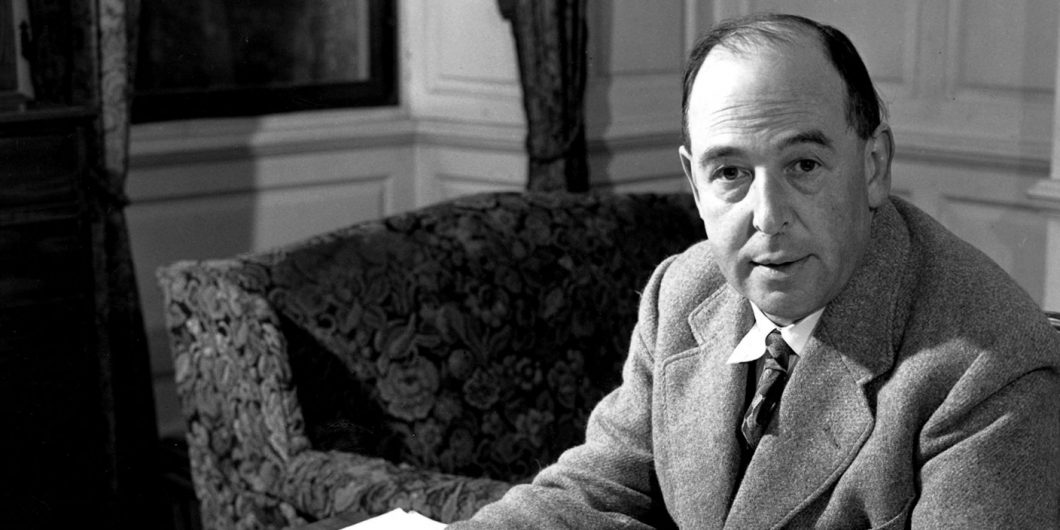If only Christian humanism can safeguard the best of paganism and of modernity in a way worthy of man, what must we learn from those that taught it?
Uncovering the Tao of C.S. Lewis
In the midst of World War II, Oxford University Press published a short book by a middle-aged don who used the way in which English was taught in secondary school to launch a defense of the idea that there is objective moral truth, that it contains deep content, and that we can know it. The author was a Fellow of Magdalen College, Oxford, where he taught literature. But C.S. Lewis had also acquired a formidable reputation as a Christian apologist, himself having embraced atheism at age 15 before returning first to theism in 1929 and then his Anglican faith of the orthodox variety in 1931.
Lewis’s short book The Abolition of Man (1943) was not, however, about religion in general or Christianity in particular. It was an affirmation of the claim that there is a self-evident moral ecology grounded in human anthropology which has been recognized in the world’s most prominent cultures, including non-Western societies. We deny, Lewis maintained, this moral reality at our peril. For to do so would not only amount to erasing our very identity as humans (ergo, the book’s title), but also because repudiation of this universal moral code leaves us helpless in the face of will-to-power types.
The Abolition of Man quickly became a best-seller and continues to be read today by people from all types of cultural and religious backgrounds. It has been praised by individuals across the philosophical spectrum ranging from Joseph Ratzinger to John Gray, Michael Polanyi, and Francis Fukuyama. Many today, including a good number of agnostics and atheists, find the present abysmal state of Western culture ample confirmation of the prophetic character of Lewis’s thesis.
More than it Seems
In light of this background, it may surprise some to learn that Lewis himself was disappointed by Abolition’s reception. In 1955, he lamented that the book “has been almost totally ignored by the public.” Given that Abolition’s first print-run had immediately sold out and there were no less than three reprints over the following ten months, one wonders which public Lewis had in mind. Yet Lewis’s biographer and friend, George Sayer, agreed with Lewis’s complaint. The three lectures on which Abolition was based, Sayer held, were “too closely argued” and “few members of his audience understood them.”
Sayer had a point. The first time I read Abolition, I found myself distracted by many of the literary allusions with which I was unfamiliar. It also dawned on me that the book was, at different points, engaged in refutations of various skeptical positions and philosophers of which and whom I then knew little. Abolition’s subtitle—“Reflections on education with special reference to the teaching of English in the upper forms of schools—was also puzzling. The connection to a deep crisis in moral reflection was not obvious.
Bringing clarity and light to Abolition’s internal structure and its historical, literary, and philosophical context is the achievement of Michael Ward in his new book After Humanity: A Guide to C.S. Lewis’s The Abolition of Man. A fellow of Blackfriars, Oxford, and Professor of Apologetics at Houston Baptist University, Ward has good claim to be the world’s leading authority on Lewis’s fiction and non-fictional writings. Ward’s purpose in producing this pathway to fuller understanding of Abolition is not primarily to re-litigate the philosophical disputes into which the book enters. Rather, it is to illuminate Abolition’s deeper background, explain the text’s otherwise obscure references, and show how Abolition played into the philosophical debates of Lewis’s time and our own. In that sense, After Humanity is much more than a guide. Ward has produced an immersion into Abolition that will benefit all readers, including those who disagree with Lewis’s specific arguments or who are skeptical of natural law philosophy in general.
Through Ward’s page-by-page, sometimes line-by-line, and occasionally word-by-word exegesis of Abolition, we discover the wide plethora of sources upon which Lewis drew to critique his opponents as well as to appeal to Western and non-Western thinkers who have maintained confidence in reason’s capacity to know moral truth . . .
Ward’s approach to his subject matter is to proceed from the general to the particular. Starting with a broad overview of Abolition’s themes, Ward then discusses the book’s immediate context and place in the history of ideas, examines its legacies, and broaches the vexed question of whether Abolition can be described as a religious work, despite Lewis’s claims to the contrary. The bulk of Ward’s analysis, however, consists of commentary and gloss on the text itself.
This is the most illuminating part of After Humanity insofar as it unpacks the particular meaning attached to words, expressions, and concepts deployed by Lewis as well as the historical and philosophical allusions invoked in Abolition—the full scope of which, I suspect, even most of the highly-erudite audience attending the original lectures were not fully familiar with. We thus learn, for example, that the curious subtitle reflects Lewis pointing the finger at the subjectivist morality that he believed was being unconsciously absorbed and (perhaps) unknowingly taught to teenagers via the medium of texts commonly used in schools throughout the English-speaking world in the 1940s.
Through Ward’s page-by-page, sometimes line-by-line, and occasionally word-by-word exegesis of Abolition, we discover the wide plethora of sources upon which Lewis drew to critique his opponents as well as to appeal to Western and non-Western thinkers who have maintained confidence in reason’s capacity to know moral truth and the subsequent liberty of all people to choose good and reject evil. Especially important in this connection is Ward’s uncovering of Lewis’s attention to how the meaning of the word “reason” had changed over time.
Reason and Reasons
As a medievalist and philologist at ease in classical Greek and classical and medieval Latin, Lewis was better positioned than most to grasp the difference between intellectus (that which enables the perception of a self-evident truth) and ratio (the taking of logical steps that enables people to arrive at a truth that isn’t self-evident). Lewis was thus able to establish that a decisive turn was taken in the eighteenth century (at least in the English-speaking world) when the sematic scope of reason became increasingly limited to ratio—including by people like Samuel Johnson who fully accepted that reason also embraced intellectus but who deployed the phrase ratio to cover both dimensions of reason.
Another valuable contribution of Ward’s glosses concerns his illustration of how crucial parts of Lewis’s argument line up with positions previously expressed by thinkers who are not specifically referenced in Abolition. Lewis’s account of the self-evident character of basic precepts of the natural law, for example, is shown to be closely aligned with that of Thomas Aquinas’s exposition in his Summa Theologiae, even though Lewis’s three lectures never mention Aquinas. Ward also notes how Lewis directly invokes one of classical liberalism’s founders, John Locke, and his commitment to “the fundamental Law of Nature” as antithetical to humanity’s abolition. That point is something upon which various contemporary critics of liberalism may care to mediate. Lewis had his criticisms of Locke but he recognized that Locke was a more complicated thinker than some of his present-day critics are willing to concede.
This brings us to Abolition’s more political dimensions, most notably how, Ward points out, “even in the middle of the Second World War, when Stalin and Hitler were plumbing new depths of cruelty and prejudice, Lewis does not exempt democracy from the dangers of subjectivism.” At the time of Abolition’s publication, the war against National Socialist Germany, Fascist Italy, and Japanese militarism was popularly portrayed as a struggle to defend democracy. This didn’t prevent Lewis from gently suggesting to his readers that democracy relies on some presuppositions that can’t be subject to majority vote or subjective preference.
As Ward writes, “Democracies can only be preserved, Lewis implied, if they view ethical systems in an undemocratic light.” This observation was increasingly echoed in the twentieth century’s latter half by figures ranging from Wilhelm Röpke to Cardinal Jean-Marie Lustiger and Rabbi Jonathan Sacks. But even to hint at such a position, as Lewis did, in the midst of what was universally pitched as a Democracy-Versus-Dictatorship cage fight to the death was bound to unsettle some of Abolition’s readers in 1943.
Absent the Tao, There is Chaos
Ward concludes his analysis of Abolition with reflections on how it might be understood in our time. The very point, he states, of untying the various threads that bind Lewis’s text together is to produce a synthesis and therefore greater understanding of the book’s unified meaning. This is particularly important, according to Ward, because Abolition’s key motif that there are self-evident truths (“the Tao”) within which we live, move, and have our being is very hard for even sympathetically-inclined contemporary students to grasp.
Ward contends that Abolition “doesn’t spend enough time explaining [this] paradigmatic issue and driving it home securely.” I’m inclined to agree. But I also think that Abolition has proved very effective at alerting several generations of readers to the very idea that there is a substantive case to suggest that 1) humans don’t somehow create morality and 2) the human mind itself bears the imprint of a universal natural morality that doesn’t change. As Ward states, “we are already in the Tao, and always remain within it, often without realizing it, whether we like it or not.”
This claim is one that, Lewis showed, has been expressed in different ways and with varying degrees of specificity and coherence in all the world’s major civilizations. But it is also a proposition that, I think it is fair to say, achieved its most sophisticated and dynamic expression in Western culture. And that is precisely why the West is especially vulnerable when the Tao, or what Wards calls “the immemorial Way, the nexus of practical reason that surrounds and supports all human beings and summons them to ethical maturity,” ends up being denied. That is Lewis’s warning to us today, and one which Ward’s After Humanity provides us with a fresh understanding of why a world without Logos and full of men without chests is a frightening one indeed.


